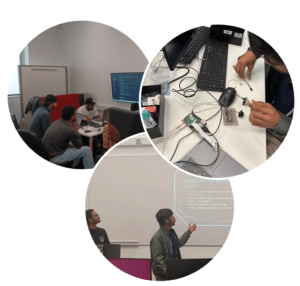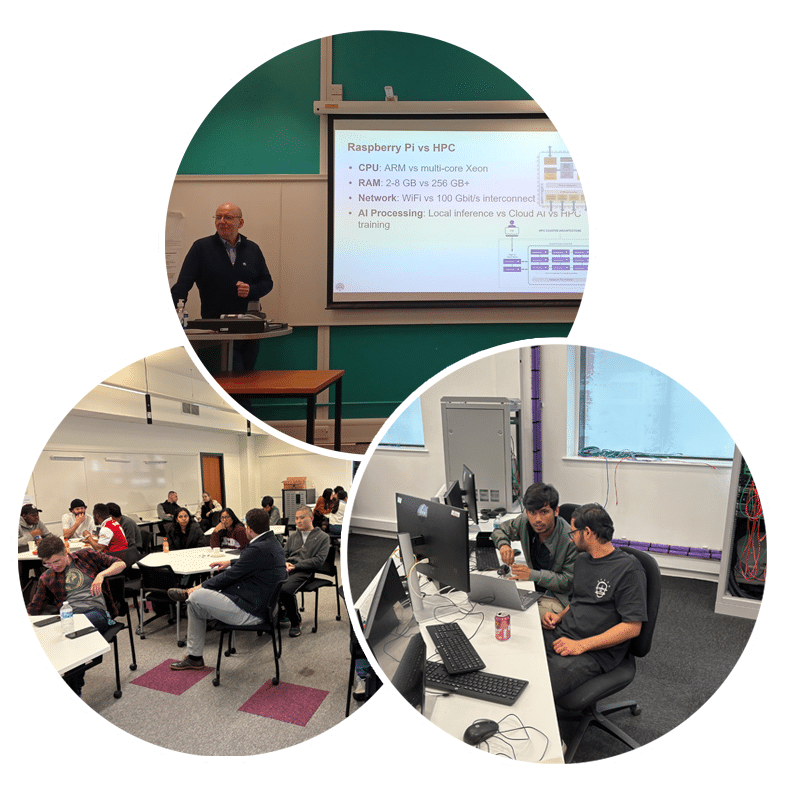Tech Skills in Action at Sheffield Hallam
Yesterday, my colleague James Page and I supported the final stage of a Smart Computing hackathon at Sheffield Hallam University. Representing Red Oak Consulting, I started the day with a talk on “Scaling Up from Pi to Planet” before students continued to work on and develop their projects.
A Different Approach to Hackathons
Unlike traditional University hackathons that often run over sleep-deprived weekends, Sheffield Hallam designed this event with accessibility and learning at its core.
The hackathon ran over several weeks, allowing students to develop their projects alongside their regular studies.
This different type of format makes a significant difference. Students with caring responsibilities or part-time jobs could participate fully without sacrificing other commitments.
Not having that weekend-only sessions means that a more diverse group of participants who might otherwise be excluded from these valuable experiences can take part.
One of the benefits of this approach is to shift the focus from competition to collaboration & learning. Rather than emphasising high-stakes prizes for a select few winners, the event rewarded participation and progress.
This approach reduced pressure while keeping the participants motivated, creating an environment (we hope) where students felt comfortable experimenting and even failing – a really important part of the learning process and an approach we value in Industry.
Throughout the hackathon, teams worked with Raspberry Pis and BBC Micro:bits to create practical solutions. Projects included fall detection systems for elderly care and inhaler training devices to improve medication usage.
Skills Development
This more inclusive hackathon model has the potential to develop capabilities that complement traditional education:
Practical Application: Students applied programming knowledge to solve concrete problems, bridging theoretical understanding with implementation.
Team Collaboration: The projects required combining hardware expertise, coding skills, and domain knowledge – teaching students how technical teams function in industry.
Sustainable Development Practices: The extended timeframe allowed for more thoughtful design and iteration, reflecting real-world development cycles rather than unrealistic crunch periods.
Problem-Solving Resilience: Teams encountered technical issues and had to adapt their approaches. The longer format gave them space to reflect on challenges rather than just implementing quick fixes.
Technical Communication: Presenting their solutions required explaining complex concepts clearly – a skill many technical graduates lack when entering industry – so any opportunity to practice this is a “good thing”.
Business Benefits
For companies like Red Oak Consulting, participation provides tangible value:
Talent Identification: We connect with students who demonstrate not just technical skills but also consistency and project management capabilities over extended periods.
New Perspectives: Student approaches often differ from industry standards, occasionally highlighting alternative methods we might not consider.
Industry Awareness: Introducing high-performance computing concepts early helps build familiarity with technologies students may work with in future roles.
Academic-Industry Links: These events strengthen connections between universities and businesses, facilitating future collaboration.
 The inclusive nature of this hackathon shows that technical events don’t need to follow the traditional high-intensity, exclusionary model to be effective.
The inclusive nature of this hackathon shows that technical events don’t need to follow the traditional high-intensity, exclusionary model to be effective.
By concentrating efforts on accessibility and learning over competition, Sheffield Hallam created an environment where more students could develop crucial skills while building meaningful projects and most importantly, having a good time (yes, work can and should be fun too).
Well done to the Sheffield Hallam team led by Dr. James Baldwin and Caren Fernandes for making the whole thing run so seamlessly. Students did seem to enjoy it too – here are a few choice quotes from the day:
“It’s been a really positive experience working with our hands and with real devices”
“We’ve learned a lot working with and learning from each other”
“We have worked with up to date tools in a way that we don’t often get to do on our University course”
“Whatever the outcome of the day, we want to continue working on this project and with each other”
For Red Oak Consulting, supporting this alternative approach aligns with our belief that the tech industry benefits from diverse perspectives and inclusive practices – not just in who participates, but in how they’re invited to participate.
Overall, a fantastic day and both James and I thoroughly enjoyed ourselves.

Martin Callaghan
Principal Consultant
Red Oak Consulting

